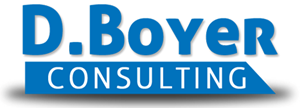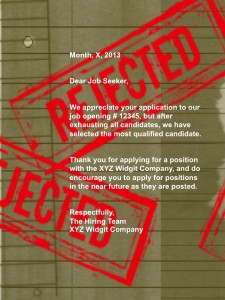Business is mostly conducted via email or phone communications.
Office hours 10:00 a.m. to 6:00 p.m, Mon. - Thurs., and 10:00 a.m. to 2:00 p.m. on Fridays.
SEND EMAIL INQUIRIES DIRECTLY TO:
Dawn.Boyer@me.com
Business is mostly conducted via email or phone communications.
Office hours 10:00 a.m. to 6:00 p.m, Mon. - Thurs., and 10:00 a.m. to 2:00 p.m. on Fridays.
SEND EMAIL INQUIRIES DIRECTLY TO:
Dawn.Boyer@me.com
Business is mostly conducted via email or phone communications.
Office hours 10:00 a.m. to 6:00 p.m, Mon. - Thurs., and 10:00 a.m. to 2:00 p.m. on Fridays.
SEND EMAIL INQUIRIES DIRECTLY TO:
Dawn.Boyer@me.com
Last Ditch Effort After the Job Application Rejection
December 9th, 2013 by Dawn Boyer
Last ditch effort after job application rejection.
You have gotten the rejection letter for the job for which you interviewed. You say a few choice words under your breath and of course, you are always curious about why someone else was chosen. You may never get the real answer, mostly because the company needs to protect themselves from any potential EEOC claim from perceived or real issues. Even if they were willing to provide you the information, they may not have time to do so.
Is this the end of the road for your career path for this company? It might not be a wash. Add a few more steps in your job search action to-do list. This is important if you had your heart set on working in this specific company or industry. You should have retained a point of contact from your interview and or business cards from the folks you were introduced to in the hiring process. Use those to your advantage.
Write a ‘second’ thank you letter to the recruiter (the first thank you note was sent immediately after the interview). Tell them how you enjoyed their professionalism, the interview questions were challenging, and you appreciate being introduced to the busy professionals within the company. Restate how your background and experience would have been an asset to the company and if the candidate they did decide to hire has a change of heart, you are still open to consideration for the job. End the letter by telling the recruiter and/or hiring manager how much you appreciate their time during the interviewing process – and – let them know if another position does come up for which you are qualified, to please reconsider you for the newer job requisition. You may also ask them if there are other open positions within the company they are having a hard time filling – perhaps you may know some qualified friends in the industry that may fill their needs?
The second follow-up letter you’ll write is to the head of the company, the CEO, president, or area manager. In this letter, you will write a glowing critique of the recruiter, their job skills, praising the hiring manager, or even dropping a compliment for the receptionist, all of who demonstrated the ultimate professionalism in the hiring process. If you encountered any negative aspects of the process, you may wish to provide a ‘useful suggestion’ or ‘constructive idea’ to help the company improve their hiring processes. (Don’t come across as a complainer, but as a problem solver.)
You may not get any return correspondence or acknowledgement from this exercise, but you have started to build a bridge to new business relationships you may be able to use in the immediate future. An example is if you were applying for a position at a company within the same industry (not a competitor), and you know the hiring manager at the first interview knows an executive at the newer job target company. If they share a trade organization, club membership, attend the same convention – or even better – share the podium at presentations or events; that is a bonus. Perhaps they could recommend you for that job to the other company’s representative based on your outstanding interview.
The point is to stay within the radar of the company you are targeting, be memorable in a positive manner, and continue to exert subtle influence on the people you meet in your career search efforts. Ensure your LinkedIn profile is loaded with rich information about your career. Once you send the final thank you letters; send an invitation to connect to these folks on LinkedIn. Staying within the circle of awareness may pay off in the near future when you showcase your professionalism in your career search efforts.
Dawn Boyer, Ph.D., is the owner of D. Boyer Consulting – providing resume writing, social media management, business development, and human resources consulting. Reach her at: Dawn.Boyer@DBoyerConsulting.com or https://dboyerconsulting.com.
Readers Comments
Last Ditch Effort After the Job Application Rejection
December 9th, 2013 by Dawn Boyer
Last ditch effort after job application rejection.
You have gotten the rejection letter for the job for which you interviewed. You say a few choice words under your breath and of course, you are always curious about why someone else was chosen. You may never get the real answer, mostly because the company needs to protect themselves from any potential EEOC claim from perceived or real issues. Even if they were willing to provide you the information, they may not have time to do so.
Is this the end of the road for your career path for this company? It might not be a wash. Add a few more steps in your job search action to-do list. This is important if you had your heart set on working in this specific company or industry. You should have retained a point of contact from your interview and or business cards from the folks you were introduced to in the hiring process. Use those to your advantage.
Write a ‘second’ thank you letter to the recruiter (the first thank you note was sent immediately after the interview). Tell them how you enjoyed their professionalism, the interview questions were challenging, and you appreciate being introduced to the busy professionals within the company. Restate how your background and experience would have been an asset to the company and if the candidate they did decide to hire has a change of heart, you are still open to consideration for the job. End the letter by telling the recruiter and/or hiring manager how much you appreciate their time during the interviewing process – and – let them know if another position does come up for which you are qualified, to please reconsider you for the newer job requisition. You may also ask them if there are other open positions within the company they are having a hard time filling – perhaps you may know some qualified friends in the industry that may fill their needs?
The second follow-up letter you’ll write is to the head of the company, the CEO, president, or area manager. In this letter, you will write a glowing critique of the recruiter, their job skills, praising the hiring manager, or even dropping a compliment for the receptionist, all of who demonstrated the ultimate professionalism in the hiring process. If you encountered any negative aspects of the process, you may wish to provide a ‘useful suggestion’ or ‘constructive idea’ to help the company improve their hiring processes. (Don’t come across as a complainer, but as a problem solver.)
You may not get any return correspondence or acknowledgement from this exercise, but you have started to build a bridge to new business relationships you may be able to use in the immediate future. An example is if you were applying for a position at a company within the same industry (not a competitor), and you know the hiring manager at the first interview knows an executive at the newer job target company. If they share a trade organization, club membership, attend the same convention – or even better – share the podium at presentations or events; that is a bonus. Perhaps they could recommend you for that job to the other company’s representative based on your outstanding interview.
The point is to stay within the radar of the company you are targeting, be memorable in a positive manner, and continue to exert subtle influence on the people you meet in your career search efforts. Ensure your LinkedIn profile is loaded with rich information about your career. Once you send the final thank you letters; send an invitation to connect to these folks on LinkedIn. Staying within the circle of awareness may pay off in the near future when you showcase your professionalism in your career search efforts.
Dawn Boyer, Ph.D., is the owner of D. Boyer Consulting – providing resume writing, social media management, business development, and human resources consulting. Reach her at: Dawn.Boyer@DBoyerConsulting.com or https://dboyerconsulting.com.

















